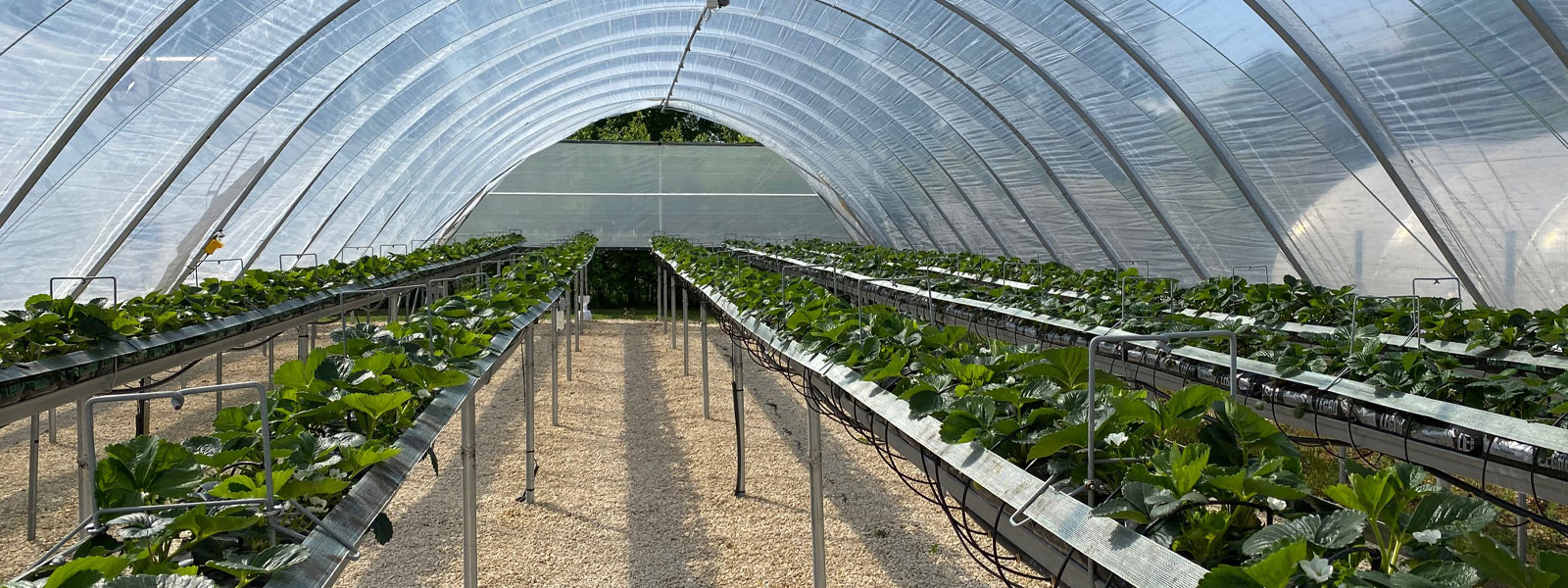Crop Care

Our Research
Using technology to care for crops involves deployment of novel sensing systems, data collection, and real time data analysis to help understand the micro-environment of individual plants within a crop. Precision agriculture requires applied data. Our robotic, machine learning, AI, and vision or sensing based solutions allow targeted selection or intervention, to support the grower or the farmer in caring for crops.
Research Projects
Mobile Robotic Platforms for Active Inspection and Harvesting in Agricultural Areas
BACCHUS. Research to deliver an intelligent mobile robotic system for harvesting of grapes - for viticulture and for table grape production. Working with industrial partners to develop robotic solutions.
Project Lead: Professor Marc Hanheide
Funder: European Commission – Horizon 2020 programme
Application of novel machine learning techniques and high-speed 3D vision algorithms for real time detection of fruit (UK Research and Innovation - Biotechnology and Biological Sciences Research Council – Career Transition Partnership Studentship)
UK Research and Innovation - Biotechnology and Biological Sciences Research Council – Career Transition Partnership funding for a studentship on "Application of novel machine learning techniques and high speed 3D vision algorithms for real time detection of fruit".
Project Lead: Professor Simon Pearson
Funder: National Institute for Agricultural Botany – East Malling Research
Optimising the light recipe for maximum photosynthesis yield and quality in strawberry (UK Research and Innovation - Biotechnology and Biological Sciences Research Council – Career Transition Partnership Studentship)
Research Council funding for a studentships on "Optimising the light recipe for maximum photosynthesis, yield and quality in strawberry".
Project Lead: Professor Simon Pearson
Funder: National Institute for Agricultural Botany – East Malling Research
ARWAC Robotic black grass weeder
This project will develop robotic technology to eradicate the main biotic constraint on UK arable production - a weed 'blackgrass'. The robot will be developed by an interdisciplinary team including robot engineers, robotic developers, farmers and weed ecologists.
Project Lead: Dr Charles Fox
Funder: UK Research and Innovation – Innovate UK
CERES, LASERBOOM
A UK Research and Innovation - CERES Project to develop a LIDAR based spray boom levelling system for application in agriculture/horticulture.
Project Lead: Professor Simon Pearson
Funder: UK Research and Innovation – Research England Connecting Capability Fund - CERES
The First Fleet - The worlds first fleet of multi modal soft fruit robots
This project addresses requirements for fleet robotics for soft fruit production in agriculture and horticulture.
Project Lead: Professor Marc Hanheide
Funder: UK Research and Innovation – Innovate UK
Feasibility study to develop a blueberry harvester
Development of a prototype blueberry picker. This is a feasibility study that will enable the development of an automatic blueberry harvesting system which uses high speed pneumatics controlled by image analysis to pick the fruit.
Project Lead: Professor Ronald Bickerton
Funder: UK Research and Innovation – Innovate UK
Robot Highways
This project aims to develop a knowledge exchange platform to empower transformation across UK and global supply chains, additionally reducing sector reliance on low skilled labour, whilst upskilling the existing workforce.
Project Lead: Professor Marc Hanheide
Funder: UK Research and Innovation – Innovate UK
FRUITCAST
This project addresses the forecasting of readiness of commercially grown strawberries. We hope that this will improve sales, support better matching of supply and demand, fewer distress promotions, reduced imports, supply chain confidence and more efficient labour scheduling.
Project Lead: Professor Simon Pearson
Funder: UK Research and Innovation – Research England Connecting Capability Fund - CERES
The Augmented Agronomist - Synthesis of AI, ML and Robotics for Decision Support (UK Research and Innovation - Biotechnology and Biological Sciences Research Council – Career Transition Partnership - National Productivity Investment Fund - Studentship)
This project sets out to provide agronomists with dedicated technological support in assessment and decision making; The project is closely linked with the RASberry project and will have access to its software and hardware resources to minimise risks and maximise synergies.
Project Lead: Professor Marc Hanheide
Funder: National Institute for Agricultural Botany – East Malling Research
An assessment of the viability of inter row cultivations for weed control in commercial narrow row crops in the UK
This project aims to explore how effective inter-row cultivation is in reducing long-term weed populations; whether they can be used to support the use of herbicides, and how the application of this machinery can be maximised within the principles of conservation agriculture.
Project Lead: Dr Shaun Coutts
Funder: Chadacre Agricultural Trust and Felix Thornley Cobbold Agricultural Trust
In field logistics for fruit production
BGG, Saga and University of Lincoln have recently completed an IUK project using the Thorvald robotic platform as an autonomous vehicle to support picker logistics. The robot will now be framed to enable full scale and rapid deployment.
Project Lead: Professor Marc Hanheide
Funder: Berry Gardens Ltd
Development and field testing of the next generation of vision guided weeding systems
This project will develop the next generation of weeding machinery based on a precision hoe tightly controlled by an intelligent vision system to assure high accuracy of hoeing operations.
Project Lead: Dr Grzegorz Cielniak
Funder: UK Research and Innovation – Innovate UK
Autonomous black grass detection
This project aims to develop and verify an automated system for rapid black-grass detection in new fields at plant level. Long-term benefits include reducing the risk of herbicide resistance and environmental contamination while protecting long-term yields.
Project Lead: Dr Shaun Coutts
Funder: UK Research and Innovation – Research England Connecting Capability Fund - CERES